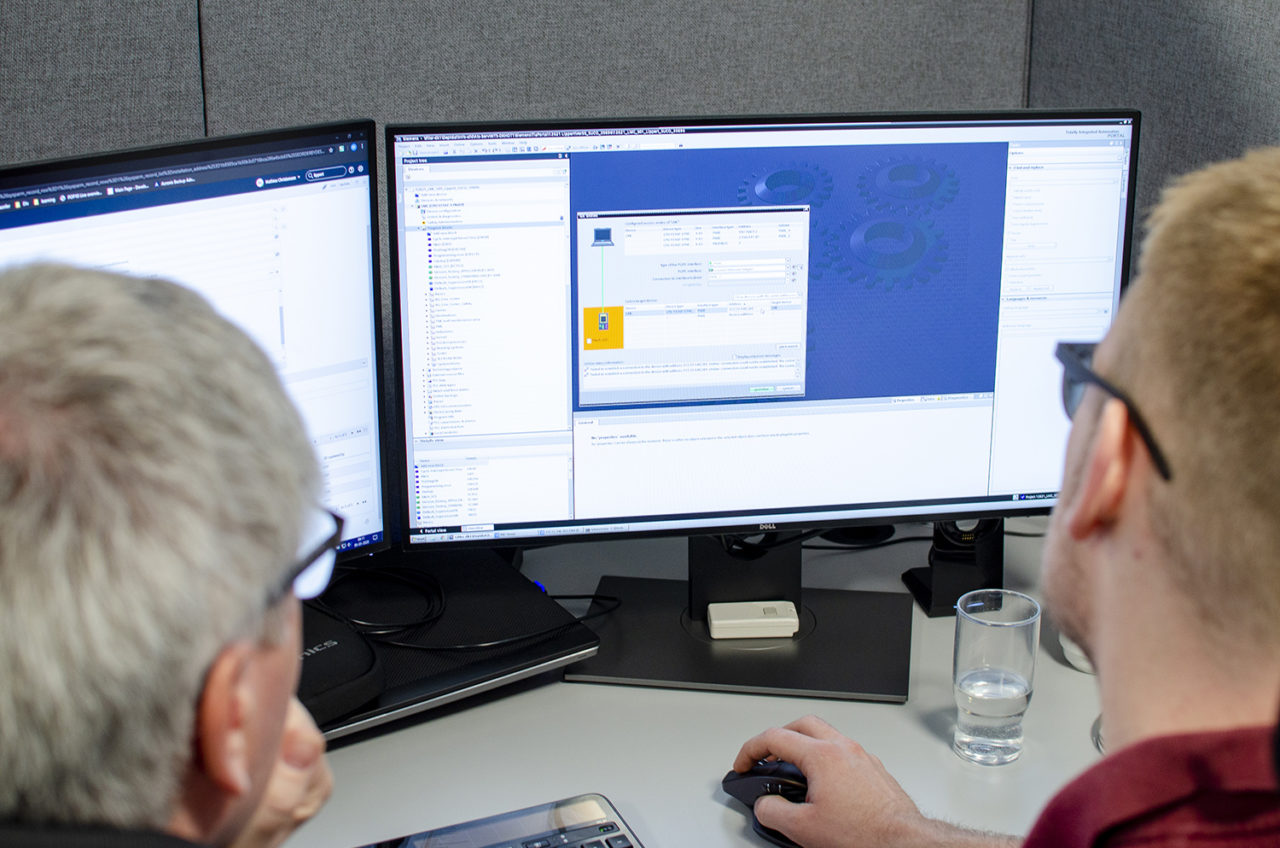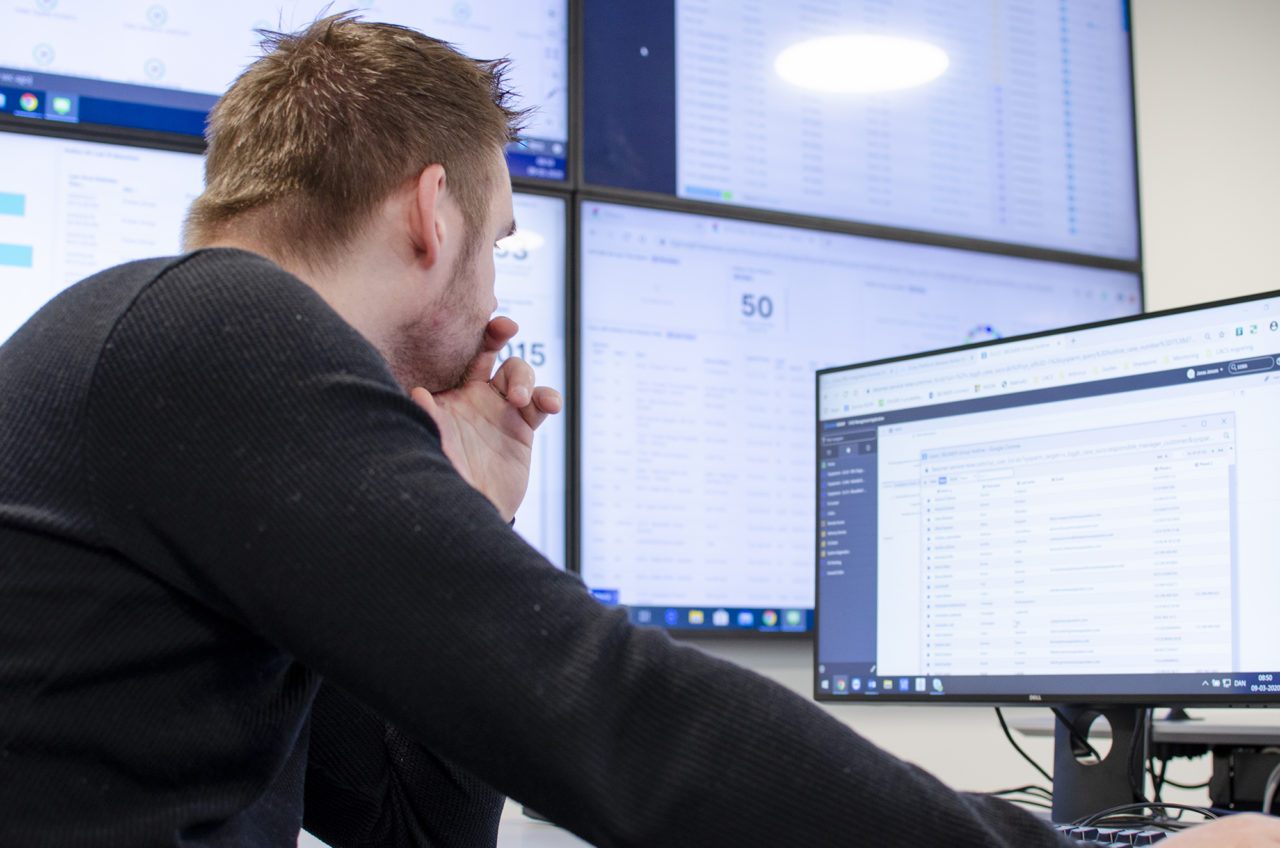Hotline Support: The AI and human collaboration for proactive support
The combination of 20+ years of Hotline engineer experience and the fresh eyes of a new Hotline engineer reveals how Hotline support responds to changes in the airport industry.

The combination of 20+ years of Hotline engineer experience and the fresh eyes of a new Hotline engineer reveals how Hotline support responds to changes in the airport industry.
At the heart of BEUMER Group’s Hotline is the situation room, or The Box. Inside The Box are four Hotline engineers who watch the monitors which flash statistics, diagrams and visualisations of different customer baggage handling systems. Each engineer is ready to take a call from a customer or is devoting specialist experience to resolving any cases that have arisen in the last few hours.
There are engineers on call 24/7 and 365 days a year to help customers who have a BEUMER Group Hotline contract to support the sortation system. Through a window, the engineers can see a similar room where trained specialists monitor the server and status on customer sites. The critical importance of monitoring is that it provides advanced warning of potential system vulnerabilities, cyber security threats and operational issues with customers’ systems.
Outside the two rooms, backup engineers work on the daily system performance tasks. These engineers also provide standby support for their colleagues inside The Box.
Mathias Buus Christensen believes that it is crucial to maintain live monitoring of the status of every system with a Hotline contract. “We have just contacted an airport in North America where we saw that a server disk was running full. The situation was not critical, but it is valuable for the person on duty in the airport control room to be aware of the situation. No one wants to see a baggage handling system stop in the middle of sorting or transporting baggage.”
Gert Pedersen has over 20 years experience as a BEUMER Group Hotline engineer and seven years experience as an on-site integration engineer in which Gert’s role was to commission BEUMER Group’s systems on customer sites around the world. Before each system was handed over to the customer, Gert was responsible for configuration and testing the system software as well as on-site commissioning. The commissioning ranges from powering-up the system, to testing the I/O lists and the overall high-level controls.
Mathias Buus Christensen’s view is one of a relatively new Hotline engineer with just over two years’ experience. Mathias joined BEUMER Group directly after graduating as a Bachelor in Technology Management and Marine Engineering. His final period as a trainee was spent specialising in Process Analysis and Automation with BEUMER Group. Now, Mathias is continuing his training as a Hotline engineer.
Proactive monitoring makes it clear that today’s Hotline is not only there to manage emergencies, but also to prevent emergencies
“The real change in the service provided by the Hotline started around five years ago,” explains Gert Pedersen. “Up until then, Hotline engineers reacted to calls received from customer sites. Now, many more incidents are discovered proactively at an earlier stage. These incidents are identified by an alert from a system sensor and the early warning allows us to act before a potential issue becomes a reality. It has taken us some time and many cases to balance the automatic monitoring so that calls are not triggered too early and not too late, but at the right time.”

Customers really appreciate being given an early notification that there may be a problem. By receiving early knowledge and support, customers have time to react and prevent a situation.
Mathias certainly gives a fresh perspective on being a Hotline engineer. “Most of the hotline engineers have years of experience in on-site integration before ‘coming home’ to cover the Hotline,” he says. “It’s different for me, because I have a more IT-related approach to automation and have been on many sites to gain hands-on experience. I’m currently training to work in The Box and I sit with the experienced engineers to learn from their expertise before I take calls. I am very comfortable with this because the experienced engineers will always have my back.”
„The situation was not critical, but it is valuable for the person on duty in the airport control room to be aware of the situation.“

While Mathias is talking, a call comes in and The Box starts to resemble an emergency room. The engineers need to know that their decisions are informed and fast and there can’t be the slightest trace of doubt. The engineers’ faces furrow in concentration and an inhouse specialist is consulted on a second line. The ‘x-rays’ of the system, such as system drawings or a visualisation tool, give the engineers a map to guide them to the source of the issue.
Most of the calls and consultancies feel as though the engineer is standing on-site next to the customer staff. With backgrounds as commissioners, BEUMER Group’s Hotline engineers have a deep ’nuts and bolts’ knowledge of the systems. This knowledge has been gained through their on-site experience in installing and commissioning sortation systems all over the world.
To Gert, the Hotline delivers very special benefits to customers. “Our strength lies in being able to see the big picture,” he says. “I have travelled for more than 20 years as a commissioning engineer and when I talk to our customers, I know exactly what a system looks like and how it feels. I also understand what the person at the other end of the line sees from where they’re sitting. When someone describes a problem, I have a set of possible causes listed in my head and can quickly reach a conclusion. I often solve the situation myself but sometimes I consult with one of our specialists. It gives our customers peace of mind to know that we understand and appreciate the issues. Currently we receive calls from airports BHS control rooms looking into here-and-now operational questions and we also get calls from airport technicians who are making use of the low system activity to perform service they were otherwise too busy to manage”
Each of BEUMER Group’s Hotline engineers also serves as a key account contact for their Hotline customers and visits each customer site at least once a year. “We know our customers very well and conversation flows easily”, says Gert. “When we come to work in The Box in the morning, we get a briefing from the engineer who has been on duty during the night. Any issues from our customers that have not been flagged as urgent wait until we come on duty. Each of us works on cases that relate to the sites with which we have a key account relationship. We know the systems well and we know which internal specialists to consult to help solve complicated cases.”
In order to stay on top of the constant changes in the industry, each Hotline engineer works on different projects outside The Box and also with the site integration department. The wealth of experience behind each engineer means that it’s easy for them to jump into the different teams. The project team gains experience from the engineers and the engineers gain insights, ensuring they maintain a high skill set.
„It gives our customers peace of mind to know that we understand and appreciate the issues“
To support predictive maintenance and optimise system performance, Hotline engineers receive monthly reports on system performance for each customer. According to Gert, “We use the logged data to identify patterns that can reveal a discrepancy that needs to be checked. These reports are like a doctor performing an electrocardiogram on a patient. The data will show that something is not right and that allows the doctor to make an informed decision before taking the next step in treatment. When seeing an irregularity, a Hotline engineer monitors the data and identifies the cause before the customer is contacted to correct the error . The problem could be a full disk in a server rack, for example, or a pattern of events that has been recognised and must be managed to prevent a die-back of baggage on an airport belt. We only carry out each solution with the customer’s consent, which is an essential part of our quality management system. This is the only way that we can be certain about who is working inside the system. At the end of a shift, the outgoing engineers brief the incoming engineers on each open case.”
The service delivered today by the Hotline engineers has evolved to reflect the changing demands in the airport industry. The Hotline service reinforces the importance to provide proactive support before the on-site operator even has a problem developing. The Hotline is there, of course, to handle emergencies, but it’s also there to reassure customers by identifying and resolving risks before they become an emergency.
The anonymised data from sites enables machine learning to detect, analyse and classify situations and then automatically warn the Hotline of any abnormalities. The prediction ultimately avoids costly downtime.
Data actively helps the Hotline to proactively monitor IT-hardware performance, such as the status of the CPU, RAM and hard disk capacity and performance. This type of real-time performance monitoring prevents unplanned baggage handling system downtime.
Data analytics can trace root causes by transforming the data and metrics into focused dashboards in local control rooms. This is time-saving for the operators, as they no longer need to know what to ask and where to look in their data.